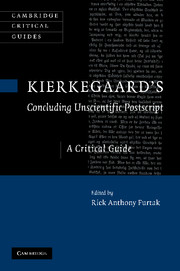Book contents
- Frontmatter
- Contents
- List of contributors
- Acknowledgments
- List of abbreviations
- Introduction
- 1 The “Socratic secret”: the postscript to the Philosophical Crumbs
- 2 Kierkegaard's Socratic pseudonym: A profile of Johannes Climacus
- 3 Johannes Climacus' revocation
- 4 From the garden of the dead: Climacus on interpersonal inwardness
- 5 The Kierkegaardian ideal of “essential knowing” and the scandal of modern philosophy
- 6 Lessing and Socrates in Kierkegaard's Postscript
- 7 Climacus on subjectivity and the system
- 8 Humor and irony in the Postscript
- 9 Climacus on the task of becoming a Christian
- 10 The epistemology of the Postscript
- 11 Faith and reason in Kierkegaard's Concluding Unscientific Postscript
- 12 Making Christianity difficult: The “existentialist theology” of Kierkegaard's Postscript
- Bibliography
- Index
1 - The “Socratic secret”: the postscript to the Philosophical Crumbs
Published online by Cambridge University Press: 04 August 2010
- Frontmatter
- Contents
- List of contributors
- Acknowledgments
- List of abbreviations
- Introduction
- 1 The “Socratic secret”: the postscript to the Philosophical Crumbs
- 2 Kierkegaard's Socratic pseudonym: A profile of Johannes Climacus
- 3 Johannes Climacus' revocation
- 4 From the garden of the dead: Climacus on interpersonal inwardness
- 5 The Kierkegaardian ideal of “essential knowing” and the scandal of modern philosophy
- 6 Lessing and Socrates in Kierkegaard's Postscript
- 7 Climacus on subjectivity and the system
- 8 Humor and irony in the Postscript
- 9 Climacus on the task of becoming a Christian
- 10 The epistemology of the Postscript
- 11 Faith and reason in Kierkegaard's Concluding Unscientific Postscript
- 12 Making Christianity difficult: The “existentialist theology” of Kierkegaard's Postscript
- Bibliography
- Index
Summary
About two years after the publication of Philosophical Crumbs, also known as the Fragments, a second book authored by Johannes Climacus appeared. The title of the new book reflected both its great length and his delight in being provocative – Concluding Unscientific Postscript to the Philosophical Crumbs. A Mimic–Pathetic–Dialectic Compilation. An Existential Contribution. What does it mean that the Postscript, published in 1846, is explicitly presented (in its title) as a “postscript” (Efterskrift) to the Philosophical Crumbs of 1844? What is a postscript and what does it do? As a hypothesis to be tested, consider that when I add a postscript to a letter I have just written, it means that I think I left out something important – something I remember after I have finished signing (or even sending) the letter that I think still needs to be conveyed. The postscript is an after-thought, in a sense, but it still serves to append something that I think cannot be left unsaid. It may serve to emphasize something that was implicit in the letter, like “PS, I love you.” Or it may provide some critical information that was not implicit in the letter – e.g., “PS, did you know that the party has been changed to Tuesday?” This latter PS imparts crucial information that I did not mention in my letter. The PS might also serve to qualify in a crucial way something that I did say in the letter – e.g. “PS, don't take what I said above as a criticism of your brother.”
Keywords
- Type
- Chapter
- Information
- Kierkegaard's 'Concluding Unscientific Postscript'A Critical Guide, pp. 6 - 24Publisher: Cambridge University PressPrint publication year: 2010
- 3
- Cited by



